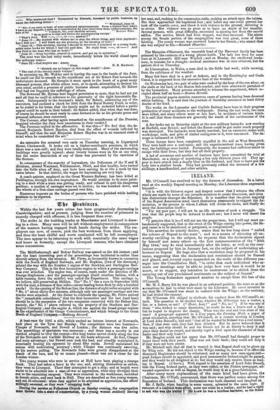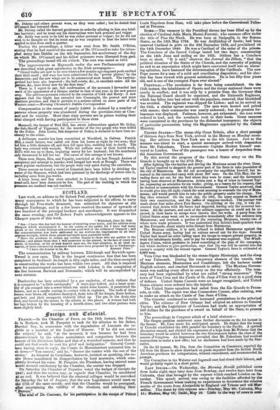IRELAND.
Mr. O'Connell has resolved to lay the &lemon of dissension. In a letter read at the weekly Repeal meeting on Monday, the Liberator thus expressed himself— "It is with the bitterest regret and deepest sorrow that I witness the efforts which'are made by -some of our juvenile members to create dissension, and circa late distractions amongst the Repeaters. It is manifest that the great majority of the Repeal Association must exert themselves strenuously to support the As- sociation, or the persons to whom I allude will divide its ranks, and finally de- stroy the Association itself- " For my poor part, I will not be an idle spectator of such a struggle. 'Tilt true that the people may be induced to desert me; but I never will desert the people. perceive that it is—I will not use the proper term, but! will say most un- handsomely. suggested, that in the event of the Whigs coming into power, the Re- peal cause is to be abandoned, or postponed, or compromised.'
This assertion he utterly denies; states that he has long since "nailed the colours of Repeal to the mast "; and as a means of silencing all un- worthy cavilling on the subject, he requests that the declaration signed by himself and many others on the first commemoration of the "30th May 1844," may be read immediately after his letter, as well as the reso- lutions proposed by him in January last, on the subject of undeviating ad- herence to Repeal. He begs also that a resolution may be proposed in his name, suggesting that the declaration and resolutions should be framed and glazed, and several copies suspended on the walls of the different pas- sages into the Conciliation Hall, "in order that each individual who at- tends our meetings may be able to judge how very base it would be to assert, or to suggest, any intention to contravene or to shrink from the carrying out of our proclaimed sentiments on the subject of Repeal." The Young Irelanders appeared anxious to escape from the ban of the O'Connell.
Mr. M. J. Barry felt he was placed in an awkward position; the more so as the accusations he had to rebut were made by the Liberator. He never intended to say that Mr. O'Connell was about to coalesce with the Whigs; on the contrary, he had denied the rumour.
Mr. O'Gorman felt obliged to vindicate his conduct from Mr. O'Connell's at- tack. The question to be decided was whether Mr. O'Gorman was a traitor' a liar, or a knave, or not? (" Hear, hear!" and "No, no! ") If he was one of those "who wished to cause dissension," no doubt he was a knave and a liar; but he hoped to disprove the charge. What was the real and true state of the case? A paragraph appeared in a Tory paper, the Evening Mail, a paper of great circulation, asserting that Mr. O'Connell, at a certain meeting in London at Lord John Russell's, had said "that all he wanted for Ireland was a real union." Now, if that were said, they bad been deluded. But he never believed that it was said; and why should he and his friends not be at liberty to deny it and 'dace their denial on record, and thereby repel a libel upon the character of their leader and their only leader?
Mr. Meagher could not but regret that Mr. O'Connell had thought proper to taunt them with their youth. That was not their fault; they could not help it if they were not born sooner.
Mr. Mitchell said, that all that is wanted is that Repeal shall not be given up for Whig rule. He did not object to the Whigs coming in, because if in office the dismissed Magistrates should be 'reinstated, and as many new ones appoizted- good Judges should be appointed, and good measures for Ireland might be passed, and they would be all delighted at it; but they would only receive them as lead- ing to Repeal. (Cheers.) With regard to the assertion of Lord John Russell, that the Young Ireland party, as they were called, or the Nation newspaper, ad- vocated separation as well as Repeal, lie would deny it as a gross fabrication.
After many more explanations of the same kind had been given, the Chairman, Mr. O'Niell, announced, that there was perfect union among the Repeaters of Ireland. This declaration was both cheered and laughed at. Mr. J. Reilly, when handing in some money, adverted to the same topic. If rumours of a coalition were afloat, some one must be a traitor; and he had a right to ask who was the traitor ? He knew he was a briefiess barrister, as his friend
Mr. Doheny and others present were, as they were called ; but he denied that O'Connell had betrayed them.
Mr. Doheny called the learned gentleman to order for alluding to him as a brief- less barrister; and he must say his observations were both personal and vulgar. Mr. Reilly was sorry to be told he was either personal or vulgar; for he did not wish to be thought so: but he must say he was surprised to hear the latter term applied to him from such a quarter. -During the proceedings, a letter was read from Mr. Smith O'Brien, Stating that he had received the sanction of Mr. O'Connell to take his trium- phal entry into Dublin on the 6th September, the anniversary of the day ski which Mr. O'Connell and his fellow prisoners were liberated from gaol.
The proceedings lasted till six o'clock. The rent was stated at 1071.
The improvements at Maynooth under the new Parliamentary grant are described with great satisfaction in the Irish newspapers-
" Grand walks are now to be seen where a few months ago stagnant pools emitted their fetid smell ; delf ware has been substituted for the pewter platter,' by the Inspectors; and the new wings are to be commenced next month. The exercise- ground has been also improved ; the ball-courts, &c., in excellent order. All the porters, &c., have livery now for the first time." There is, I regret to say, full confirmation of the accounts I forwarded last week of the appearance of a disease, similar to that of last year, in the new potato crop. The previous accounts referred to the counties of Cork and Kerry: it now appears that the blight has extended into Connaught, the poorest and most destitute province, and that it prevails to a serious extent on some parts of the Western coast—Morning' Chronicle's Dublin Correspondent.
Compensation to the extent of nearly 2,0001. is claimed by a number of persons whose property was plundered during the provision-riots at Clon- mel and its vicinity. More than sixty persons are in prison waiting their trial charged with having participated in those riots.
Mannsell, the fanner of Bird Hill, has sworn informations against Mr. Going, the Sub-Sheriff of Tipperary, for the murder of the two people who were killed by the Police. John Lewis, Sub-Inspector of Police, is declared to have been se- ceesory to the crime.
A deliberate murder has been committed at Woodford, in Galway. Patrick Mill, a small farmer, was called out from his house at night by two men; they led him a little distance off, and then fell upon him, stabbing him to death. The body was covered with wounds. While the ruffians were at their horrid work, Hill's wife ran up to them, imploring mercy for her husband; but the murderers only threatened to kill her too. The cause of this outrage is not known.
Three men, Hayes, Rice, and Fogarty, convicted at the last Nenagh .Assizes of conspiracy and attempt to murder, were hanged last week at Nenagh. There was great popular excitement, but the people were very quiet during the execution.
Three seamen on board a vessel at Limerick have been killed by drinking the water of the Shannon, which had been poisoned by the discharge of sewers into it, including some from gas-works. A large hemp and flax store attached to Limerick Gaol, together with the tread-mill, have been destroyed by fire. The part of the building in which the prisoners are confined was not touched.



























 Previous page
Previous page